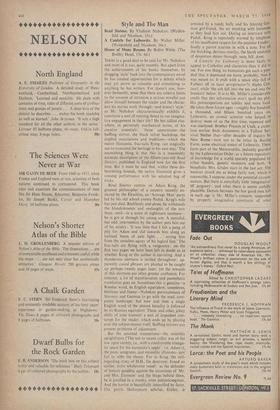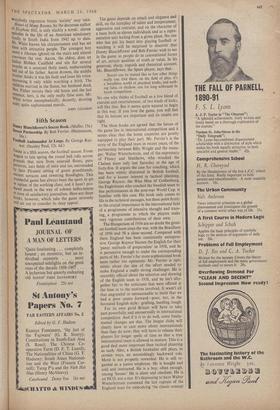Style and The Man
House of Many Rooms. By Robin White. (The Bodley Head, 13s. 6d.) THERE is a good deal to be said for Mr. Nabokov and most of it was, quite recently. But apart from the achievements of his books themselves, by dragging 'style' back into the contemporary novel he has created opportunities for a debate which may yet prove as valuable and stimulating as anything he has written. For doesn't one, how- ever hesitantly, sense that there are relative limits to the amount of intrusion a serious novelist can allow himself between the reader and the charac- ters his stories work through—and doesn't 'style: as Mr. Nabokov characteristically exhibits it, constitute a sort of running threat to our imagina- tive engagement in their life? He has talked else- where, in perversely mechanical terms, of his creative essentials: 'those apparatuses—the baffling mirror, the black velvet backdrop, the implied associations and traditions—which the native illusionist. frac-tails flying, can magically use to transcend the heritage in his own way.' The astonishing thing is that this is a reasonably accurate description of the fifteen-year-old Bend Sinister, published in England now for the first time. But it must be said that,. within these dis- heartening bounds, the native illusionist gives a rousing performance with his adopted bag of tricks.
Bend Sinister centres on Adam Krug. the greatest philosopher of a country recently en- slaved by the Ekwilists, an 'Average Man' party led by his old school enemy Paduk. Krug's wife has just died. Recklessly and alone, he withstands the blandishments and onslaughts of the new State. until—in a scene of nightmare nastiness— he is got at through his young son. A merciful, but odd, intervention by the author puts him out of his misery: 'it was then that I felt a pang of pity for Adam and slid towards him along an inclined beam of pale light, . . . saving him from the senseless agony of his logical fate.' The frac-tails are flying with a vengeance: on the first two pages we have been left in doubt as to whether Krug or the author is narrating. And a thunderous alertness is invited throughout : ap- parently casual phrases are planted to be caught up perhaps twenty pages later: yet the rewards of this alertness are often greater confusion. For instance, a lot of transliteration and parenthetic translation goes on. Sometimes this is genuine—a Russian word, its English equivalent; sometimes, fictitious and funny—Nabokov portmanteaux of Slavonic and German to go with the mad, com- posite landscape; but now and then a single English word of the utmost banality is followed by its Russian equivalent. These, and other, jokey shifts of tone transmit a sort of impudent con- tempt for the reader, which ends up by playing over the subject-matter itself. Baffling mirrors can present problems of adjustment.
But the assorted mannerisms—the resistible sprightliness (`The not so recent collar was of the low open variety, i.e., with a comfortable triangu- lar space for his namesake's apple: i.e. Adam's), the puns, anagrams. and recondite allusions—just- fail to stifle the theme. For in Krug, 'the self- regarding irony of H.H., the destroyer, found an earlier, more wholesome vessel: as the defender of human quiddity against the incursions of `Mr. and Mrs. Etermon' and the thugs behind them, he is justified in a cranky, even pedanticlegoism. And the horror is beautifully intensified by farce. The gentle Shakespeare scholar, Ember. is arrested by a randy bully and his tittering Ger- man girl-friend, the air smoking with innuendo as they lead him out. During an interview with Paduk. Krug is repeatedly warned by telephone of his insufficient respect forthe pustular Leader: finally a parrot scurries in with a note. For all the finicking, devious overlay, the harsh anatomy of despotism shines through; seen, felt, done. A Canticle for Leibowitz is more likely to appeal to Catholics and classicists than it did to me. For one thing, its humanists got such a poor deal that it depressed me more, probably, than It was meant to. It ends with a space ship full of Fathers off to (quo peregrittatur?) Alpha Cen- tauri. while 'the ash fell into the sea and into the breakers' below. It is to Mr. Miller's considerable credit that this information won't spoil the plot. His preoccupations are subtler and more local. He takes three future ages—roughly five hundred. a thousand, and fifteen hundred years on. Leibowitz, an atomic scientist who helped to destroy most of us the first time; repented and was martyred. Brother Francis of Utah, a credu- lous novice, finds documents in a Fallout Sur- vival Shelter that—after decades of inquiry by New Rome—turn out to be relics (a Racing Form, some electrical notes) of Leibowitz. These form part of the Memorabilia, jealously guarded by the Leibowitzian Order, as a future repository of knowledge for a world sparsely populated by tribal bandits, genetic monsters *and both. A bicephalic Mrs. Grales stars in the last act. The humour struck me as being fairly raw, which is reasonable. I suppose, under the potential circum- stances. But there is mercifully little 'imaginative' SF jargonry: and what there is seems awfully plausible. Debate between the few good men left in each age is Mr. Miller's concern, supported by properly imaginative constructs of what wretchedly regressive forms 'society' may take. House of Many Rooms, by the decorous author of Elephant Hill, is only slackly a novel: eleven episodes in the life of an American missionary f,,arnilY in South India from 1942 up to date. Mr. White knows his circumstances and has set them
with attractive people. The youngest boy
meets a bhutam (ghost) on the stairs and almost convinces the rest. Aaron, the eldest, does an Indian Holden Caulfield and sits for several months as a sannyasi (holy man), embarrassing hell out of his father. Aaron drowns, the middle brother thinks it was his fault and loses his voice, recovering it only while watching a birth. The children married in the States, her husband dead, Mrs. Fisher revisits their old home and the last sentence, hers, is the only really false note. Mr. White writes unemphatically, decently, drawing "jet, quite sophisticated morals.
JOHN COLEMAN



















































 Previous page
Previous page